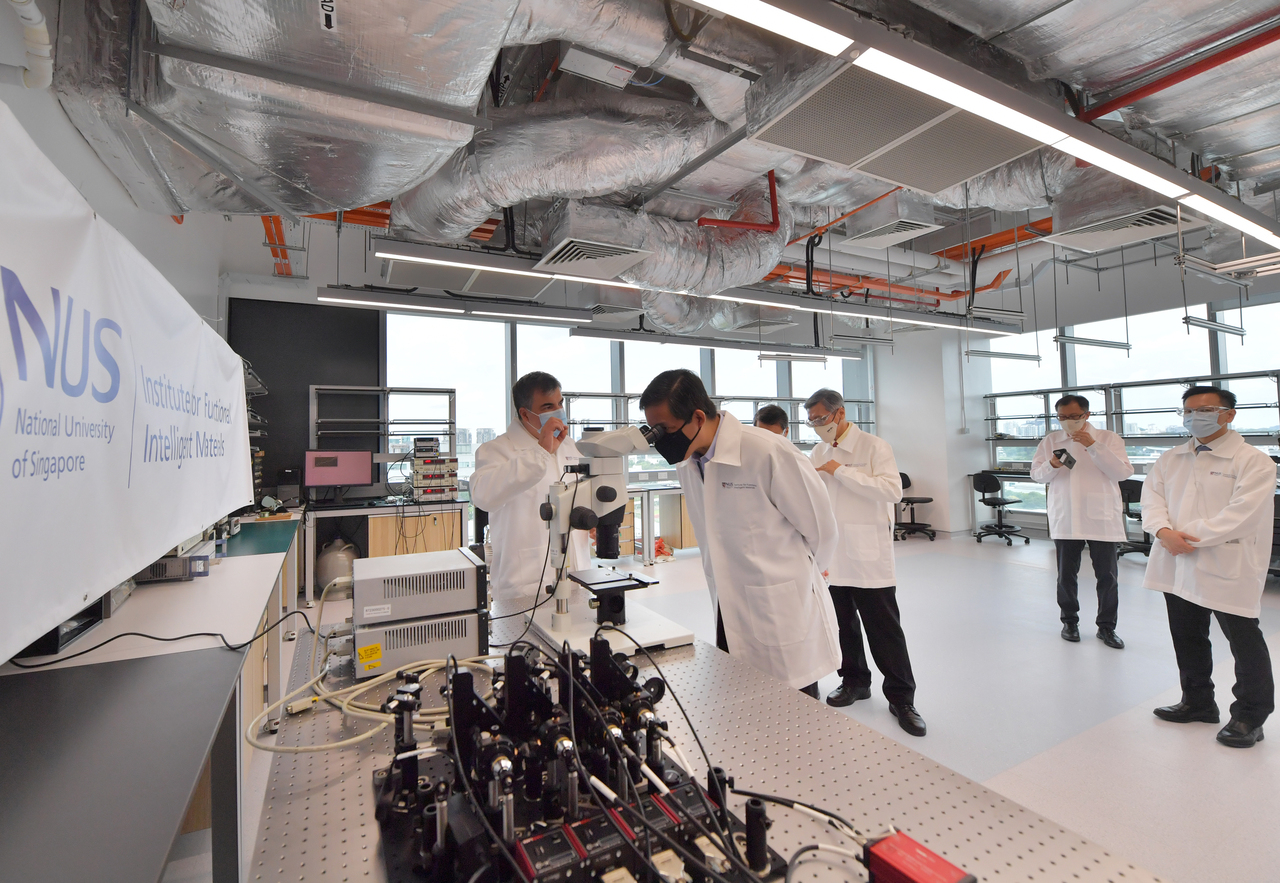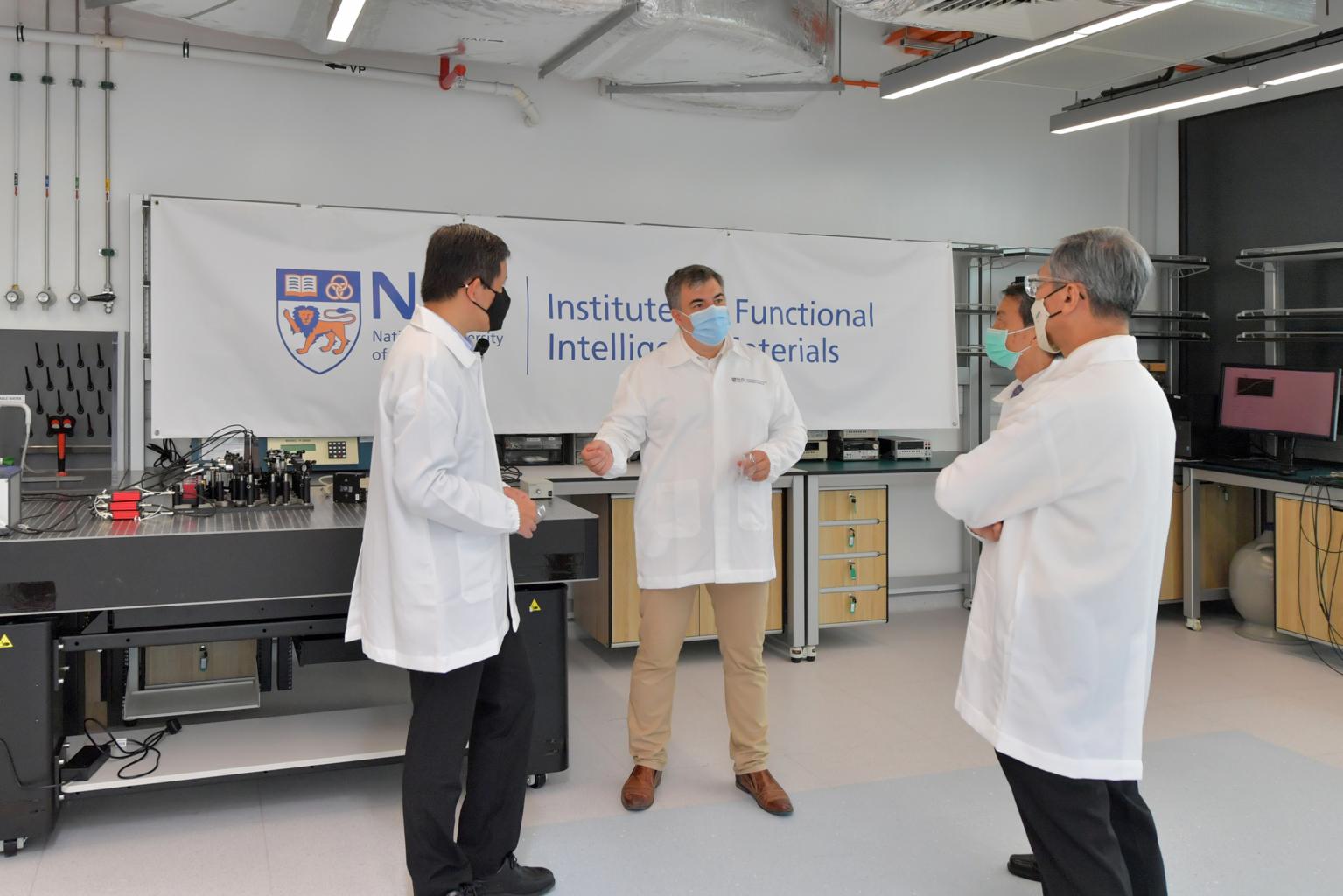New NUS research centre to study functional intelligent materials with uses such as in artificial organs
Sign up now: Get ST's newsletters delivered to your inbox

Professor Konstantin Novoselov (far left) showing Mr Chan Chun Sing (at the microscope) around one of the new laboratories on Oct 7, 2021.
ST PHOTO: ALPHONSUS CHERN
SINGAPORE - A new centre - the first of its kind in the world - that will focus on research of functional intelligent materials used to develop things like artificial organs, opened on Thursday (Oct 7) at the National University of Singapore (NUS).
With $200 million in funding over the next 10 years provided by the Ministry of Education and NUS , the centre will work on making ground-breaking discoveries into what are called functional intelligent materials.
These are materials that have properties that adapt to different environments and have memory functions. They have uses in the development of artificial organs, smart membranes, smart batteries and catalysts.
The Institute for Functional Intelligent Materials (I-FIM) aims to transform how materials are discovered, researched and applied, in order to create solutions for the community.
The centre is co-directed by Nobel prize-winning scientist Professor Konstantin Novoselov as well as Professor Antonio Castro Neto.
I-FIM is the sixth research centre of excellence in Singapore.
The research centre of excellence scheme was established in 2007 by the Research Innovation and Enterprise Council with the aim of bringing in research talent, enhancing graduate education in Singapore universities and training quality research manpower.
Five such centres were established at NUS and Nanyang Technological University (NTU) between 2007 and 2011.
One of them, the Singapore Centre for Environmental Life Sciences Engineering, has helped in the development of effective methods to detect the presence of Covid-19 virus in wastewater, air and surfaces in residential estates and foreign worker dormitories.
The new centre in NUS was officially launched by Education Minister Chan Chun Sing on Thursday.
"The first five research centres of excellence have boosted Singapore's research ecosystem, and their outstanding research has helped Singapore to manage complex challenges, such as Covid-19. We look forward to I-FIM playing a significant role in our research landscape and becoming a globally renowned institute that will attract, retain and support world-class academic investigators, enhance graduate education in NUS, and create new important knowledge in materials science," he said.
Once fully running, I-FIM will have over 100 researchers and PhD students working in its facilities, which are housed on the NUS Kent Ridge campus. The centre will offer 50 PhD scholarships and over 100 post-doctoral fellowships over the next 10 years.
NUS doctoral student Tan Jin Da, 26, said: "It is truly exciting to be involved in such an interdisciplinary area of research which challenges me to think critically and integrate ideas from different disciplines in solving complex problems."
Researchers in I-FIM are already working on creating material-level solutions, like a targeted drug delivery agent. This innovation is important for diseases like cancer, as the smart material will be able to release the drug only when it detects the presence of a cancer cell, leaving the patient's healthy cells unharmed.

NUS President Tan Eng Chye said: "Materials research is poised to play a pivotal role in tackling some of the most pressing global challenges. For this reason, we have designated it a key area of focus at NUS, and over the years have amassed some of the world's most prolific and prominent talents in this important field."
"Our hard work and focus are being recognised on the global stage with NUS recently ranked seventh in the world for its materials science research output. Now, with the establishment of I-FIM, I am confident that the impact of NUS' materials science work will become even more far-reaching," he added.


